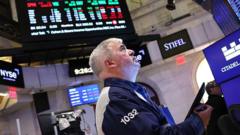In a significant recovery from recent tariff-induced losses, Wall Street's major indices have experienced their longest winning streak in two decades, driven by unexpectedly positive job growth.
Wall Street Recovers as Tariff Concerns Ease Amid Positive Job Reports

Wall Street Recovers as Tariff Concerns Ease Amid Positive Job Reports
US stock markets see an upswing following positive employment data and potential trade negotiations with China.
Wall Street stocks have rebounded from losses linked to President Donald Trump's global tariffs, marking the longest uninterrupted winning sequence for US equities since 2004. Investors saw gains for an impressive ninth consecutive day, bolstered by a stronger-than-anticipated jobs report and optimistic prospects for US-China trade dialogues. As trading wrapped up on Friday, the major US indices closed sharply higher, with the S&P 500 and Nasdaq gaining 1.5%, while the Dow Jones Industrial Average rose by 1.4%. A standout performer was the tech sector, led by gains from Microsoft and Nvidia, which both saw increases of over 2%.
The positive momentum was further supported by the Department of Labor's report indicating that employers added 177,000 jobs in April, beating analysts' expectations, despite a decline from March's hiring figures. The unemployment rate remained stable at 4.2%, instilling further confidence in the market. Compounding the optimism was China's announcement that it is open to resuming trade talks with the US, a critical factor given that China currently imposes the highest import tariffs globally at 145%.
Analysts, including Carl Weinberg from High Frequency Economics, interpreted the job numbers as a sign of stability, dismissing fears of an impending recession. "There is nothing to complain about here," he commented. Seema Shah, chief global strategist at Principal Asset Management, remained cautiously optimistic, stating that while a gradual economic slowdown is expected, the US has a viable chance to avoid recession if it mitigates tariff tensions promptly. However, some economists, including Olu Sonola from Fitch Ratings, cautioned that the ramifications of Trump's tariffs might take time to fully manifest, indicating that the economic outlook still carries significant uncertainties.






















